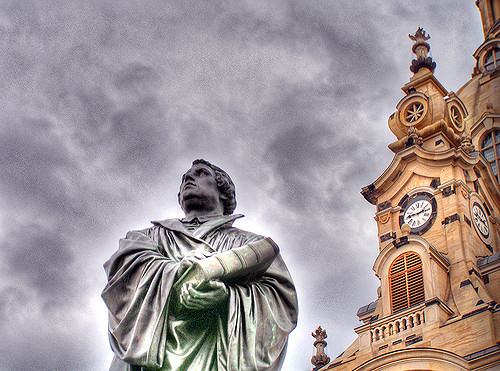Commentary on Jeremiah 31:31-34
On this Reformation Sunday, we hear words of promise from the prophet Jeremiah, words about a new covenant and a renewed relationship between God and God’s people.1
The words are addressed to a people in exile, far from home and bereft of hope. The covenant between God and Israel, the covenant made so long ago at Sinai, is (or seems to be) broken. God has not protected Israel from harm and they have been taken into exile.
Into such a situation, the prophet speaks words of promise. But he frames those promises in terms of the very relationship in question. The prophet speaks of a covenant—like the one made at Sinai—between YHWH2 and Israel. “The days are surely coming, says YHWH, when I will make a new covenant with the house of Israel and the house of Judah” (Jeremiah 31:31).
There is both continuity and discontinuity with what has come before. The continuity lies in the character of God and the love God continues to have for a wayward people. God will not abandon Israel forever. God will not forget God’s promises made so long ago at Sinai:
“I will dwell among the Israelites, and I will be their God” (Exodus 29:45; cf. Exodus 6:7).
“And I will walk among you, and will be your God, and you shall be my people” (Leviticus 26:12).
Just so, in this new covenant, God promises, “I will be their God, and they shall be my people” (Jeremiah 31:33). The relationship is not new. Israel knows this God, and God knows this people. The promises Jeremiah speaks build on a long and shared history between YHWH and Israel, a history marked by wavering on the part of the people and by faithfulness on the part of YHWH. God continues to love this wayward people; they continue to be God’s treasured possession. In this new covenant there is indeed continuity with what has come before.
The discontinuity is, of course, implied with the term, “new.” This is a new covenant with Israel, not like the covenant at Sinai, “a covenant that they broke, though I was their husband, says YHWH” (Jeremiah 31:32). Still, what is new about this covenant is not so much its content, but the means by which God will bring it about.
But this is the covenant that I will make with the house of Israel after those days, says YHWH: I will put my law within them, and I will write it on their hearts; and I will be their God, and they shall be my people. No longer shall they teach one another, or say to each other, “Know YHWH,” for they shall all know me, from the least of them to the greatest, says YHWH; for I will forgive their iniquity, and remember their sin no more. (Jeremiah 31:33-34)
The old covenant, written on stone tablets and scrolls, will be replaced by the new covenant, written on flesh. The first set of stone tablets was broken (Exodus 32:19), the second set written again (Exodus 34:1) and hidden away in the Ark of the Covenant (Deuteronomy 10:5). The book of the law, containing the stipulations of the covenant, likewise was stored beside the Ark (Deuteronomy 31:24-26) and mostly forgotten until it was rediscovered in the reign of King Josiah (2 Kings 22), in the early days of Jeremiah’s prophetic career.
Unlike the old covenant, then, written on stone tablets that can be broken and scrolls that can be lost, the new covenant will be written within the people, on their very hearts. No need for remedial religious education, because everyone will know YHWH, from the king to the stable boy, from the oldest elder to the youngest child.
And it will all be YHWH’s doing. “I will forgive their iniquity, and will remember their sin no more.” The people have not demonstrated a great aptitude for faithfulness during the many years of the old covenant, so this time YHWH will do it differently. This time, the covenant relies solely on YHWH’s mercy, YHWH’s ever-present grace in forgiving a disobedient people and calling them back into relationship with him.
The themes of a new (or renewed) covenant and of God’s overwhelming grace are, of course, fitting for a celebration of Reformation Day. Martin Luther did not believe that he had discovered something radically new in Scripture when he found there the doctrine of salvation by grace through faith. He rediscovered a treasure that the church of his day had largely lost. The movement he began was as much a restoration as a reformation—the rediscovery of God’s abundant grace in the new covenant established in and through Jesus Christ. Luther was restoring the church to a right understanding of that covenant.
There is, then, in Luther’s theology a deep continuity with what had come before. Luther knew that God’s nature does not change. God was, is, and will continue to be a God of great mercy, forgiveness, and love for a wayward people. It is that people’s (the church’s) understanding of God’s nature that had become clouded in Luther’s day. Like Jeremiah, then, Luther called the people of his day to a new understanding of God and a renewed emphasis on God’s grace and God’s abiding love even for a sinful people.
And it is all God’s doing. In and through Jesus Christ, the God of Jeremiah continues to forgive, renew, reform, and call God’s people into right relationship with him and with one another. God is faithful, even when we are not. That is the good news that both Jeremiah and Luther proclaimed, and it is news that can and should be celebrated on this Reformation Sunday, preferably with trumpets and always with great joy.
Notes
- Commentary first published on this site on Oct. 30, 2011.
- I do not vocalize the divine name out of respect for our Jewish brothers and sisters, who do not traditionally speak that most holy name out loud.



October 29, 2023